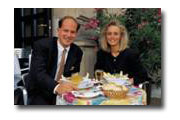
| ||||||
|
|
Our WorkWhat do pairs do together?Once policymakers and their low-income constituents, (either parents or youth living in foster care) are invited and have signed up, the “walking” and “talking” begins. Conversations that partners share are usually personal, one neighbor to another. They talk about the challenges they face in their families, their careers, the events of a stressful day, their goals and how to achieve them. These personal day-to-day details touch on policy-related issues such as transportation, childcare, and education and help address how the system can be made better. Over one month, partners share life experiences and discoveries through:
At the end of the month, participants are invited to an open-mike reception, hosted by the WAM coordinating agency, to share their experiences with other participants, the public, the media and one another. |
“I was paired with the Mayor and we had a great experience and got to know each other. Walk a Mile had a huge impact on my life.” Oregon low-income participant |
|
Walk a Mile Program Ph: 206-543-3027info@walkamile.org This project is affiliated with the University of Washington School of Social Work |

